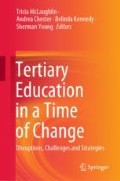Abstract
As long as there have been people in Australia, there has been pedagogy—learning approaches and teaching methods.
Access this chapter
Tax calculation will be finalised at checkout
Purchases are for personal use only
Notes
- 1.
Dhumbah Goorowa, means ‘commitment to share’, in Woi wurrung and Boon wurrung, the language groups of the peoples of the eastern Kulin Nation. Bundyi Girri is Wiradjuri. Bundyi poses the question; asking for something to be shared—shared with me/us? Girri means futures.
- 2.
This is a significant change as it acknowledges the untrue myths that have been generated around colonisation and the national Anglo-Australian narrative. In addition, it specifically acknowledges the unchanged sovereignty that the First Nations never relinquished. This is a key driver within the Bundyi Girri process.
References
Arbon, V. (2008). Arlathirnda Ngurkarnda Ityirnda being-knowing-doing: De-colonising indigenous tertiary education. Teneriffe: Post Pressed.
Bell, D. (1987). And we are not saved: The elusive quest for radical justice. New York: Basic Books.
Bell, D. (1993). Faces at the bottom of the well. New York: Basic Books.
Bessarab, D., & Ng’andu, B. (2010). Yarning about yarning as a legitimate method in indigenous research. International Journal of Critical Indigenous Studies, 3(1), 37–50.
Bourdieu, P. (1984). Distinction: A social critique of the judgement of taste (R. Nice, Trans.). Cambridge, MA: Harvard University Press.
Bourdieu, P. (1986). The forms of capital. In J. Richardson (Ed.), Handbook of theory and research for the sociology of education (pp. 241–258). Westport: Greenwood.
Bourdieu, P., & Passeron, J. (1991). Reproduction in education, society and culture (2nd ed.) (R. Nice, Trans.). Thousand Oaks, CA, US: Sage Publications.
Donald, D. (2012). Forts, colonial frontier logics, and aboriginal-Canadian relations: Imagining decolonising educational Philosophies of education. In A. Abdi (Ed.), Decolonising Philosophies of education (pp. 91–111). Amsterdam: Sense Publishers.
Freire, P. (1970). Padagogy of the oppressed (M. Ramos, Trans.). London: Penguin Books.
Geia, L., Hayes, B., & Usher, K. (2013). Yarning/aboriginal storytelling: Towards an understanding of an indigenous perspective and its implications for research practice. Contemporary Nurse, 46(1), 13–17.
Gomez, L. (2004). A tale of two genres: On the real and ideal links between law and society and critical race theory. In A. Sarat (Ed.), The blackwell companion to law and society (pp. 453–470). Carlton: Blackwell Publishing.
Keating, P. (2015). Australia through aboriginal eyes: The only way to understand our land. In Address delivered in Sydney to mark the 23rd anniversary of his Redfern Park speech.
Moodie, N. (2014). The dark side of the force: The downside of social capital and indigenous higher education. Canberra: Unpublished Ph.D. Thesis.
Moreton-Robinson, A. (2004). Whiteness, epistemology and indigenous representation. In A. Moreton-Robinson (Ed.), Whitening race: Essays in social and cultural criticism (pp. 75–88). Canberra: Aboriginal Studies Press.
Queensland Curriculum & Assessment Authority. (2020, January 1). Yarning circles. Retrieved February 18, 2020, from https://www.qcaa.qld.edu.au/about/k-12-policies/aboriginal-torres-strait-islander-perspectives/resources/yarning-circles.
Rigney, L. (1999). Internationalization of an indigenous anticolonial cultural critique of research methodologies: A guide to indigenist research methodology and its principles. Wicazo Sa Review, 14(2), 109–121.
RMIT University. (2016). Reconciliation action plan 2016–2019. Melbourne: RMIT University.
RMIT University. (2019). Dhumbah Goorowa: Reconciliation plan 2019–2020. Melbourne: RMIT University.
RMIT University. (2019b, January 31). Bundyi Girri. Retrieved February 17, 2020, from https://www.rmit.edu.au/media-objects/multimedia/video/staff-site/bundyi-girri#collapseOne.
Said, E. (2003). Orientalism. London: Penguin Books.
Shulman, L. (2005a). Signature pedagogies in the professions. Daedalus, 134(3), 52–59.
Shulman, L. (2005b). Pedagogies of uncertainty. Liberal Education, 91(2), 18–25.
Tuck, E., & Gaztambide-Fernández, R. (2013). Curriculum, replacement and setter futurity. Journal of Curriculum Theorising, 29(1), 72–89.
Williams, R. (1997). Vampires anonymous and critical race practice. Michigan Law Review, 95, 741–765.
World Indigenous Peoples’ Conference on Education. (1999). The Coolangatta statement on indigenous rights in education. In World Indigenous Peoples’ Conference on Education (pp. 1–20). Hilo, Hawai’i: WIPCE.
Yunkaporta, T. (2009). Aboriginal pedagogies at the cultural interface Ph.D. dissertation. Townsville: James Cook University.
Author information
Authors and Affiliations
Corresponding author
Editor information
Editors and Affiliations
Rights and permissions
Copyright information
© 2020 The Editor(s) (if applicable) and The Author(s), under exclusive license to Springer Nature Singapore Pte Ltd.
About this chapter
Cite this chapter
Brigden, C., Fricker, A., Johnson, R., Chester, A. (2020). Speaking Together: Reflections on Reconciliation, Yarning Circles, and Signature Pedagogies. In: McLaughlin, T., Chester, A., Kennedy, B., Young, S. (eds) Tertiary Education in a Time of Change. Springer, Singapore. https://doi.org/10.1007/978-981-15-5883-2_11
Download citation
DOI: https://doi.org/10.1007/978-981-15-5883-2_11
Published:
Publisher Name: Springer, Singapore
Print ISBN: 978-981-15-5882-5
Online ISBN: 978-981-15-5883-2
eBook Packages: EducationEducation (R0)

